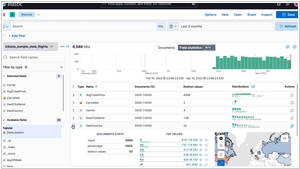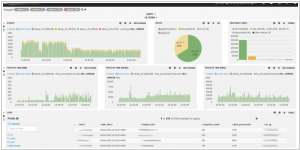Kibana vs Logstash
July 27, 2023 | Author: Michael Stromann
Kibana and Logstash are both crucial components of the Elastic Stack, a suite of powerful tools used for data ingestion, analysis, and visualization. While they work hand-in-hand to manage and analyze data, they serve distinct purposes and possess key differences.
Logstash is primarily responsible for data ingestion and processing. It acts as a data pipeline, collecting data from various sources, such as log files, databases, or message queues, and then processing and transforming that data before sending it to Elasticsearch for indexing. Logstash allows users to parse and enrich data, making it more structured and suitable for storage and analysis. Its robust filtering capabilities enable users to handle different data formats and handle potential data inconsistencies. However, Logstash is primarily concerned with data ingestion and lacks the data visualization features present in Kibana.
On the other hand, Kibana serves as the data visualization layer of the Elastic Stack. It provides a user-friendly web interface that allows users to interact with the data stored in Elasticsearch. Kibana offers a wide range of visualization options, including bar charts, line graphs, heat maps, and more. Users can create dashboards to present multiple visualizations together, providing a comprehensive overview of the data. Additionally, Kibana supports powerful search and query functionalities, enabling users to explore and analyze data in real-time. Unlike Logstash, Kibana does not handle data ingestion but relies on Elasticsearch to store and retrieve data for visualization and analysis.
See also: Top 10 Business Intelligence software
Logstash is primarily responsible for data ingestion and processing. It acts as a data pipeline, collecting data from various sources, such as log files, databases, or message queues, and then processing and transforming that data before sending it to Elasticsearch for indexing. Logstash allows users to parse and enrich data, making it more structured and suitable for storage and analysis. Its robust filtering capabilities enable users to handle different data formats and handle potential data inconsistencies. However, Logstash is primarily concerned with data ingestion and lacks the data visualization features present in Kibana.
On the other hand, Kibana serves as the data visualization layer of the Elastic Stack. It provides a user-friendly web interface that allows users to interact with the data stored in Elasticsearch. Kibana offers a wide range of visualization options, including bar charts, line graphs, heat maps, and more. Users can create dashboards to present multiple visualizations together, providing a comprehensive overview of the data. Additionally, Kibana supports powerful search and query functionalities, enabling users to explore and analyze data in real-time. Unlike Logstash, Kibana does not handle data ingestion but relies on Elasticsearch to store and retrieve data for visualization and analysis.
See also: Top 10 Business Intelligence software




